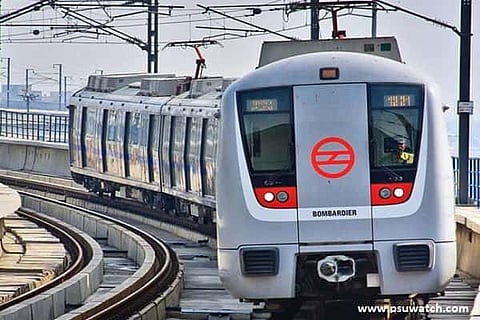
- News Updates
- PSU Watch
- Defence News
- Policy Watch
- हिन्दी न्यूज़
- Jobs Watch
- States News
- Event News

New Delhi: Prime Minister Narendra Modi is set to flag off India's first-ever fully automated driverless train service on the 37-km long Magenta Line (Janakpuri West to Botanical Garden) of Delhi Metro on December 28, the Delhi Metro Rail Corporation (DMRC) said on Thursday. On the same day, the Prime Minister will also launch fully operational National Common Mobility Card (NCMC) for travel on Airport Express Line. The driver-less trains, having six coaches, are equipped with several advanced features.
These new trains of Delhi Metro have undergone significant technological as well as eco-friendly upgrades and many additional features have been added to increase passenger comfort. They are designed for a maximum speed of 95 kmph and operational speed of 85 kmph, the Delhi Metro had said earlier.
DMRC also said that they are allowing cash transactions in a limited way at metro stations. The service had earlier been put on hold amid the coronavirus pandemic as DMRC had been implementing contactless services at its metro stations in order to contain the spread of the virus. However, DMRC added that token sale is still not permitted. It also said that public is advised to use cashless methods for protection against Covid-19.
DMRC completed 18 years of commencing passenger operations on Thursday since the year 2002. It was on December 24, 2002, that operations on the 8.4-kilometre-long Shahdara–Tis Hazari section was flagged off and passenger services were started from the next day. Since then the Delhi Metro has emerged as one of the fastest growing Metro networks in the world both in terms of ridership as well as network length. With a network of 390 kilometres spanning 11 lines, the Delhi Metro is among the largest Metro networks anywhere in the world.
The expansion of the network has also been among the fastest in the world, as more than 380 kilometres of new lines have been added since 2002. During the pre-covid times, about 65 lakh journeys were being performed on weekdays on the Delhi Metro, making it the mass transportation backbone of the National Capital Region (NCR).
Today, about 350 train sets operate on the Delhi Metro system for 18 hours a day and perform more than 5,000 trips across the 285 stations on the network maintaining a consistent punctuality of over 99.9 percent.
(PSU Watch– India's Business News centre that places the spotlight on PSUs, Bureaucracy, Defence and Public Policy is now on Telegram. Join PSU Watch Channel in your Telegram and stay updated)
